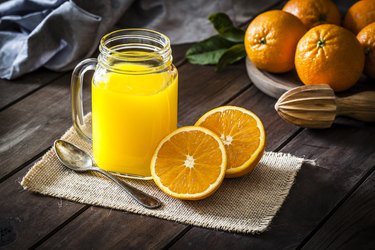 What Is the Acidity Level of Orange Juice? Image Credit: fcafotodigital/E+/GettyImages
What Is the Acidity Level of Orange Juice? Image Credit: fcafotodigital/E+/GettyImages
The acidity of foods and beverages is rated on a pH scale ranging from zero for highest acidity to 14 for highest alkalinity, which is the opposite of acidity. A food or drink with a pH of 7 is considered neutral, neither acidic nor alkaline. The pH of orange juice is between 3.30 and 4.15 depending on the variety of the fruit, where and how it's grown and how it is processed. Whether acidic foods and drinks are helpful or harmful to your body has been a hot topic of discussion in recent years.
Comparing pH of Orange Juice
To compare orange juice with other fruits and fruit juices, remember that lower pH values equal higher acidity:
- Lemon juice: 2.00 to 2.60 pH
- Lime juice: 2.00 to 2.35 pH
- Grape juice: 3.30 to 3.50 pH
- Orange juice: 3.30 to 4.15 pH
- Peaches: 3.30 to 4.05 pH
- Apple juice: 3.35 to 5.60 pH
- Pomegranate juice: 3.50 pH
- Prune juice: 3.70 to 4.00 pH
- Apricot nectar: 3.78 pH
- Blackberries: 3.85 to 4.50 pH
- Tomato juice: 4.10 to 4.60 pH
- Mango juice: 4.60 pH
According to this list, lemon juice has the highest acidity of the fruit juices listed, while mango juice has the lowest acidity level. Whether or not the acidity of a food will affect you depends partly on how much of it you consume. For example, a squeeze of lemon in your iced tea or water won't have the same effect as a glass of lemonade.
Individual tolerance for acidity varies among people. Many people aren't bothered by orange juice at all but can't tolerate tomato-based foods and vice versa. Fruits can be deceiving too, considering that grape juice is more acidic than orange juice, so don't rule out any fruit or juice as being too acidic until you look into it.
Choosing Alternative Beverages
If you're looking for alternatives to orange juice, you might be surprised to learn that many non-juice drinks are acidic too. For instance, the pH of Coca-Cola at 2.525 pH makes it the third-most acidic soft drink after RC Cola (2.387 pH) and Cherry Coke (2.522 pH).
Compare the acidity of orange juice with other common beverages:
- Orange juice: 3.30 to 4.15 pH
- Mineral water: 4.00 to 11.60 pH
- Coffee: 6.20 pH
- Carrot juice: 6.40 pH
- Tap water: 6.50 to 8.50 pH
- Distilled water: 7.00 pH
- Tea: 7.20 pH
Understanding the Effects of Acidic Beverages
Acidic drinks like orange juice can affect the upper gastrointestinal tract of some people, resulting in acid reflux, heartburn, sour stomach or other unpleasant conditions. However, fruit juices are still beneficial for their nutrients. Different parts of the body have different pH levels depending on their purpose. Blood pH is slightly alkaline — around 7.35 to 7.45 pH — while the stomach, with a 3.50 pH, needs to be acidic to break down food.
Some researchers were concerned that consuming too much acidic food and drink could make the blood too acidic, and the body would compensate by pulling alkaline material from other parts of the body. For example, they theorized that calcium might be leached from the bones to counter the acid, putting the body at risk for osteoporosis or other diseases.
However, studies have not shown that the food and drink you consume changes your blood pH. In fact, fruit and fruit juices have an alkalizing effect on the body once they are metabolized, even if they start out acidic. If orange juice bothers your stomach, experiment with other juices that are less acidic, or choose neutral water spritzed with orange or lemon for flavor if you like.
Deriving Other Benefits From Oranges
- Treating colds quickly. The vitamin C in oranges and orange juice can help a cold or its side effects go away more quickly than just letting the virus run its course.
- Flushing out phlegm. The citric acid in oranges and orange juice also helps get rid of the phlegm that forms with the cold virus and other upper-respiratory conditions.
- Keeping phlegm from forming. Consuming oranges and orange juice also keeps too much phlegm from forming.


